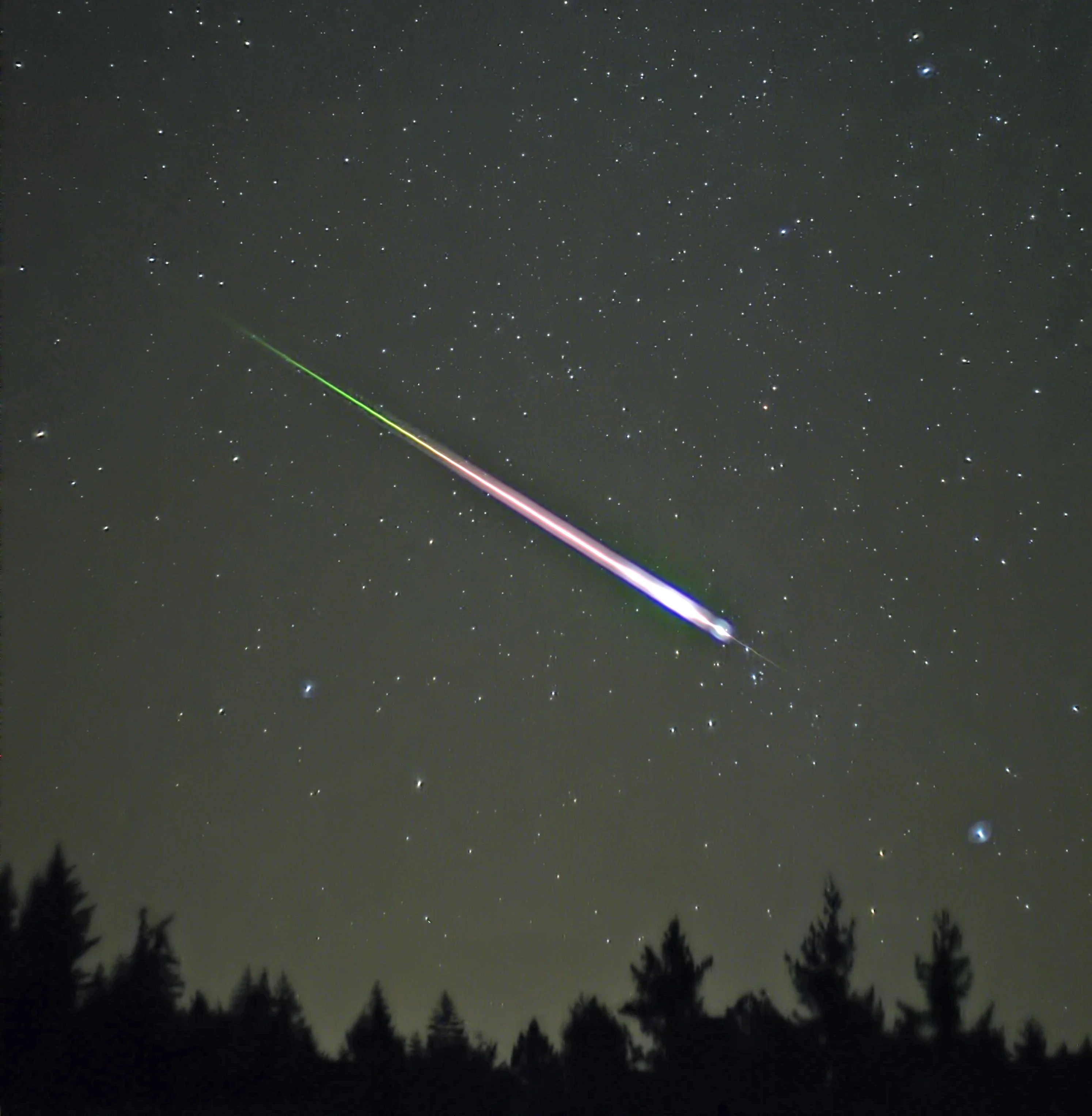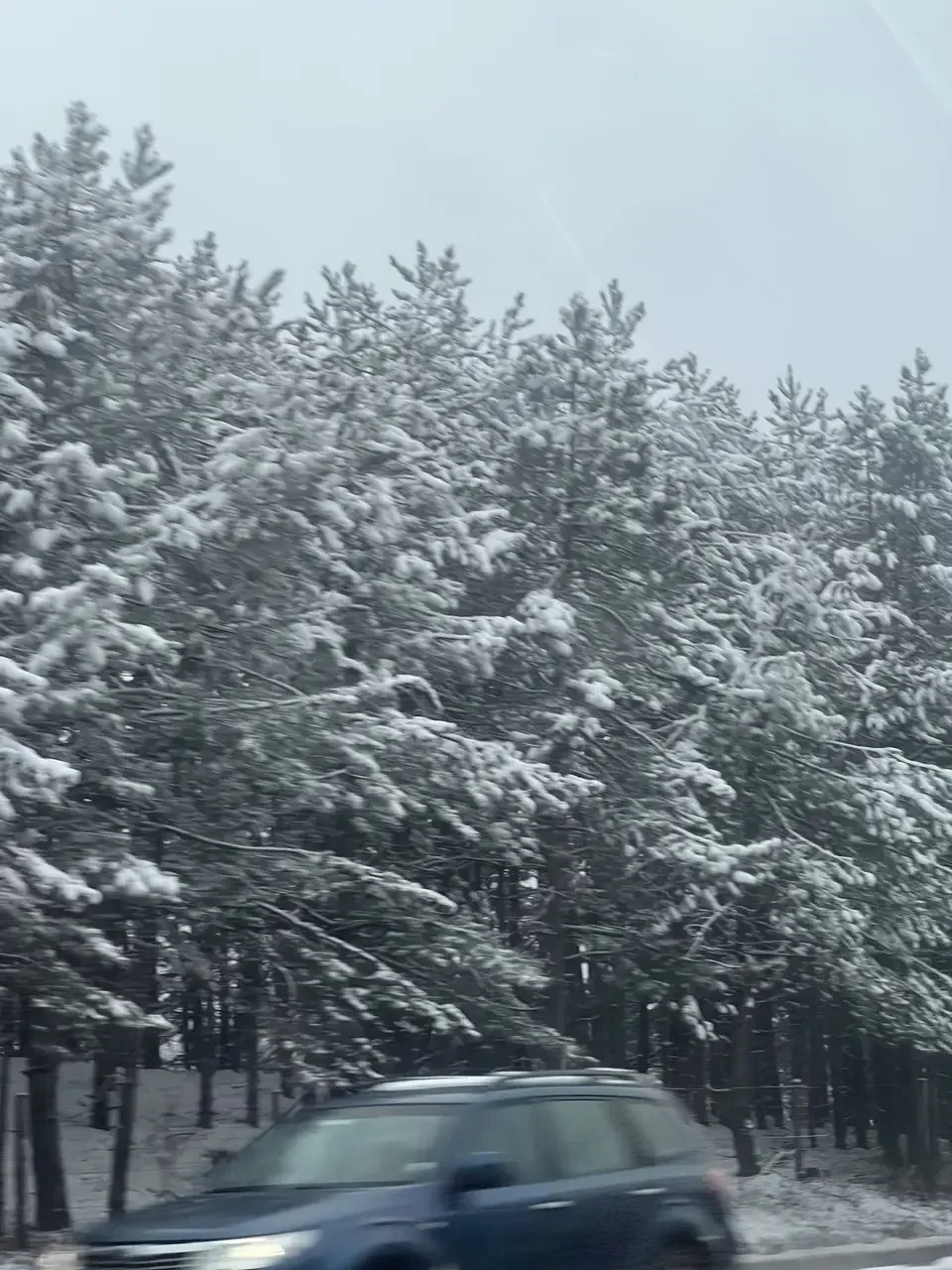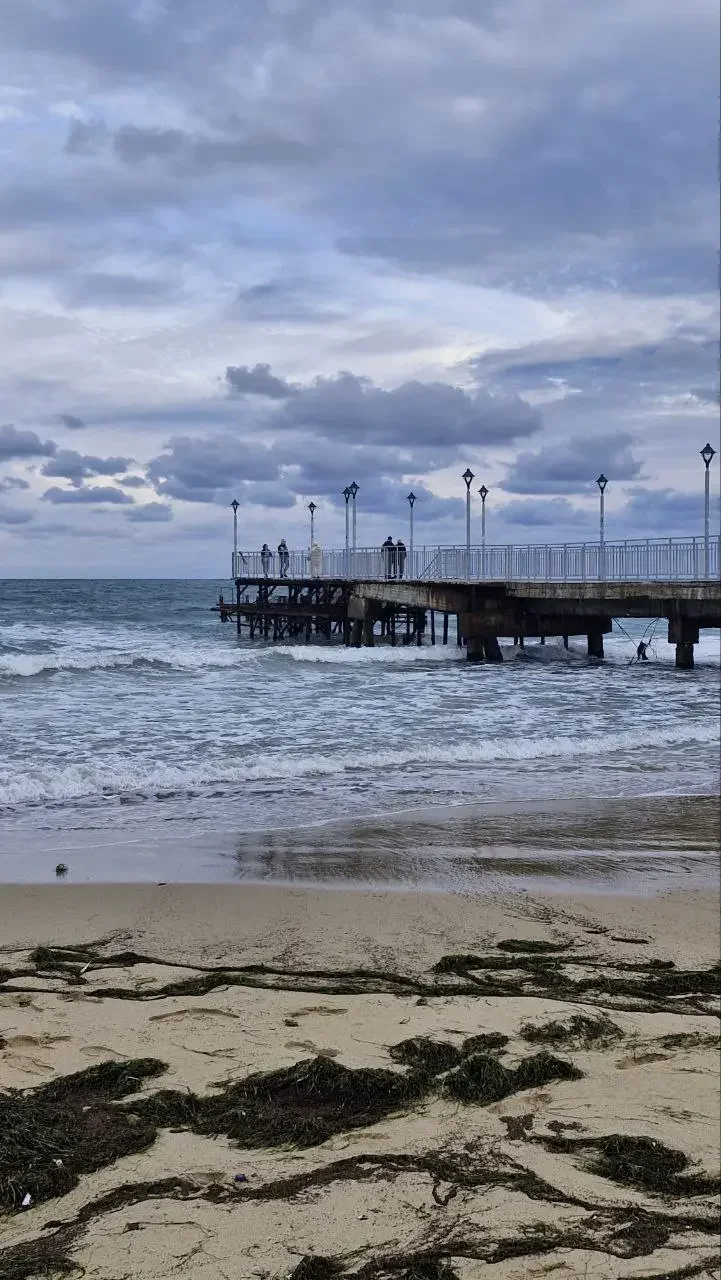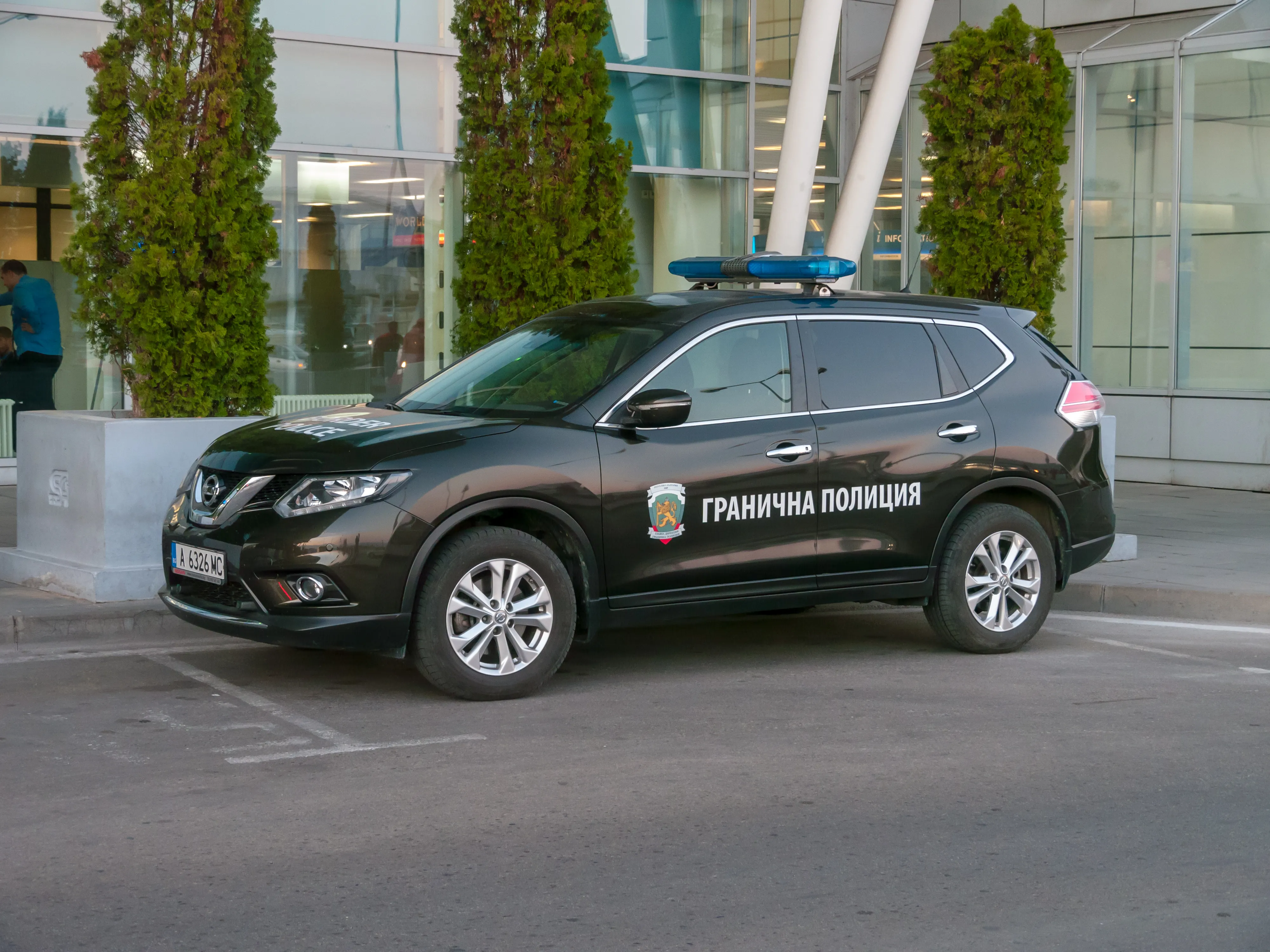The Leonid meteor shower, an annual spectacle in the sky, will reach its peak this evening, November 17th. Residents of Bulgaria are expected to have the opportunity to observe this impressive astronomical phenomenon around 8:00 PM, according to information from the publication "Amateur Astronomer's Guide 2025", published by the Department of Astronomy at the Faculty of Physics of Sofia University "St. Kliment Ohridski".
The Leonids are known for their meteors, which are characterized by high speed. These space particles can pass through the Earth's atmosphere at a speed of about 70 kilometers per second. Under ideal observation conditions, stargazers can expect to see up to 15 "falling stars" per hour from the Leonid meteor shower. The optimal times for observing meteor showers are usually between midnight and before sunrise. The radiant, or the apparent point from which the meteors appear to originate, is located in the constellation Leo, from which the shower gets its name.
The Leonids are one of the oldest and fastest meteor phenomena. The parent body of this shower is the comet 55P/Tempel-Tuttle. The meteors move at a speed of about 70 kilometers per second, making them among the fastest. For this reason, their effective observation with binoculars and telescopes can be a challenge.
The Leonid meteor shower is active in the period from November 6th to 30th.
You may also like
The publication "Amateur Astronomer's Guide" is in its sixth consecutive year and is a valuable resource for astronomical enthusiasts. The book provides detailed descriptions of upcoming astronomical events for the year, as well as useful observation tips for amateur astronomers. Its author is Pencho Markishki, a physicist from the Institute of Astronomy with NAO at BAS and from the Department of Astronomy at the Faculty of Physics of Sofia University (SU) "St. Kliment Ohridski". The publication of University Publishing House "St. Kliment Ohridski" is distributed free of charge to students, physics and astronomy teachers in secondary schools, students from astronomy circles and participants in various astronomy schools. In addition, an electronic version of the publication is freely available on the website of the Department of Astronomy.







Коментари (165)
VANKATABG
17.11.2025, 12:39Слава боже, метеори отново
bg_gost
17.11.2025, 12:40Да, днес ще ги видим
PESHO98
17.11.2025, 12:43Ах, какво фантастично
bai_ivan2004
17.11.2025, 12:43Е,ннесеизненадавам
guest123
17.11.2025, 13:01потокметеори,азщегинаблюдавам
BG_GOST
17.11.2025, 13:03Хей,несигоправи,тованеепотокметеори,
guest123
17.11.2025, 13:05че пика този вечер, излези да го видим
че
17.11.2025, 13:05смешно е, че пикът е вече този вечер
BARONA
17.11.2025, 13:02аз така мисля, ще го наблюдавам този вечер, заради
p. петров
17.11.2025, 13:21Аз не че ще ги виждам, но скиптър
гошо
17.11.2025, 13:23Хий, петров
bai_ivan1979
17.11.2025, 13:23хей, ако искам да ги видя, трябва да се
2017
17.11.2025, 13:24Какво има да прави скиптър с метеорите? 🙄
xD
17.11.2025, 13:25Хей, какво ти липва, ако не си готов да излез
PROSTO_CHOVEK
17.11.2025, 13:25да, ако има такава нощ, може да видим нещо
kirov89
17.11.2025, 13:26Haha, ти се радваш, че няма да видиш мете
Admina2009
17.11.2025, 13:22Сме6но е 😜
a. Миланов
17.11.2025, 13:24Haha, не се пази от метеорите, а пази с
fanata
17.11.2025, 13:24Хей, не си шегувай, ако видиш над 15 метеори!!
Nqkoi
17.11.2025, 13:24къди се крие астерoidът? 🤔
гражданин_х
17.11.2025, 13:29като цяло, нещо като това няма да го видим
4EAF5
17.11.2025, 13:31Абе моля те
avtoritet
17.11.2025, 13:31Да, за мен и за българите, никога не се е
BG_Tigar1996
17.11.2025, 13:48Аконегивидиш,нямапроблеми
DARKANGEL
17.11.2025, 13:49Хей, не го преувеличавай, Тигар!!
asdasd1974
17.11.2025, 13:58Ах, какво чудо
bat_jordan
17.11.2025, 14:01Да, най-накрая нещо интересно за промената в природата
ludata
17.11.2025, 14:02Хм, нещо да гледаме, извини Бога, освен 😡
МАЙСТОРА
17.11.2025, 15:00Къде е това?
804E
17.11.2025, 15:03Хайде извън града, ще ги видим
BabaGanka
17.11.2025, 15:11аз така мисла, 4е тази вечер ще бъде чудес!!
заради_метеорен
17.11.2025, 15:13че си тоа метеорен поток заради?
gringo_77
17.11.2025, 15:20аз очаквам повече от 15 падащи звезди на
човек_хий
17.11.2025, 15:23Хий,човек
ZLATA_KOTI
17.11.2025, 15:24Хей, човек
pesho98
17.11.2025, 15:23полето на зехните, ха-ха
AVTORITET
17.11.2025, 15:24E, ах, да ги видим тези метеори
348
17.11.2025, 15:28Чакам ги, дали ще изпратят метеори над Русия
ASD123
17.11.2025, 15:29хей, чакай, дали ще бъдат щастливи, ако
m. Миланов
17.11.2025, 15:30хайде, не се занимавај с тях, само интересува
vasil_p2019
17.11.2025, 15:28Смешно е
BRATVASKO
17.11.2025, 15:30Мене ми се чува какво ще ги виждаме, ако
BLAGOI
17.11.2025, 15:32Hah,ченесаморуснацитехванатметеори,аи
maga2024
17.11.2025, 16:00Абе моля те, това е чудно
bai_ivan
17.11.2025, 16:04aх ама какво чудно
e_че
17.11.2025, 16:04E, че си готов за шоу!
4ERVENO_FLAG
17.11.2025, 16:04Хехе, не било чудно, аче
vankataBG1988
17.11.2025, 16:01аз така мисля, че това ще бъде най-удивит
349
17.11.2025, 16:04Ха ха, не се държи за такива предсказания 👏
Doktora1996
17.11.2025, 16:04Ха ха, аз не мисля, че това ще бъде
b. Миланов
17.11.2025, 16:08Ах, най-накрая
BG_Tigar2019
17.11.2025, 16:12Смешно е, че ги хващат тук и там, а 🤔
BabaGanka
17.11.2025, 16:23Сега ще ги наблюдавам, а не шофирането по тр
4603F
17.11.2025, 16:28метеори, не метеорити от русия, надежно
BLAGOI
17.11.2025, 16:31хей, не се зарадвай, че не са от русия
a. миланов
17.11.2025, 16:32хех, не мисля, че ще видим нито един руски а
хубаво_ах_какво
17.11.2025, 16:48ах, какво хубаво
ninja2024
17.11.2025, 16:52да види6 звезди, а не да мислиш за русия
petrov
17.11.2025, 17:01азтакамислq,четоващебъдефеноменално
[email protected]
17.11.2025, 17:03Аз така мисла, 4е ще го видим tonight
BAT_VASKO
17.11.2025, 17:07да видиш ли, че няма да види
MAGA
17.11.2025, 17:29Йо, не гледай към небето тази вечер, 😏
KAKA_
17.11.2025, 17:31Че какво си правеш, не се радвай на метеорите?
asdasd
17.11.2025, 17:33хей, не се безпокоят, ще видим само няколко
peshaka
17.11.2025, 17:38Ах, ще ги видим тяхнните светлини
смешно
17.11.2025, 17:40смешно е, че някои още мислят за звезди
avtoritet1987
17.11.2025, 17:42Хайди,далищевидиминяколкорускиспът
prosto_chovek
17.11.2025, 17:42да, най-добре да се радват, че не се случ
BabaGanka
17.11.2025, 17:52слава българия, която може да гледа метеори
DIMITAR
17.11.2025, 17:54хаха,несамометеориможемдагледаме,но
KOMENTAR_BG
17.11.2025, 17:55Хей, ако можем да видим метеорите, то и Русия
bg_gost
17.11.2025, 18:01Ох,чудисно
BG_Tigar
17.11.2025, 18:12Хайде, дали ще ги видим?
bai_ivan2010
17.11.2025, 18:15Ако си нне заспиваш по времето на пика
BCB
17.11.2025, 18:17Да, може би
vankatabg
17.11.2025, 18:17Щегивидишаконесивзатвор!! 💸
holera
17.11.2025, 18:48Да ги видим, дннешните метеори
guest123
17.11.2025, 18:51Ами и руснаците не могат да ни видят с техния Курс
BAI_IVAN
17.11.2025, 19:03Като че ли Земята ще се обстрелява от небето 👍
prosto_chovek
17.11.2025, 19:04eh, ама какво да ти кажа, всички ще се радват!
не_и_мете
17.11.2025, 19:37Леониди, и пак не забраваме днешния мете
ivanka
17.11.2025, 19:40Хей, не се обезпокои, че не забравяме
C76
17.11.2025, 19:42Хей,защонезабравяме?
PESHO98
17.11.2025, 19:41како си, дадо? сега ще гледам метеори,
p. Костов
17.11.2025, 19:47Братя, не зная защо носят метеори от Русия, но
9873
17.11.2025, 19:49Хей, нямам време да се занимавам с метеор
l. Иванов
17.11.2025, 19:51Хей,руситесапусналипакнякаквошпионско
ЛУД_ПЕТКО
17.11.2025, 19:48Още една целувка от космоса
therealivan
17.11.2025, 19:57Аз така мисля, чи това е фенноменално!!
maga2002
17.11.2025, 20:01ха,немеинтересувазаметеорите,ноакомогат
N. Георгиев
17.11.2025, 20:17звездата ми отговара на викот
ADE
17.11.2025, 20:18хехе,звезднотовампирствовечесеизключва
jivko
17.11.2025, 20:19хайде, че звездата ми отговаря на викот
MAIMUNATA
17.11.2025, 20:19че ти се страхуваш от звезда?!!
holera1974
17.11.2025, 20:21аз така мисля, че това ще бъде най-хубавото наблюд
ASD123
17.11.2025, 20:31чакам ги, защо не приключват с тях в русия и
[email protected]
17.11.2025, 20:36Хе, това са метеори, а не политици
komentar_bg
17.11.2025, 21:01Вече като това
не
17.11.2025, 21:09върху небето, не във войната
bg_tigar
17.11.2025, 21:11Хей, че ще гледам метеори, а не да се бор
74A3
17.11.2025, 21:13Але, хайде да гледаме метеорите
не
17.11.2025, 21:15Ха, не ло6о идея
asdasd
17.11.2025, 21:16Да,сипо-хубаводасерадваменаприродата
AVTORITET
17.11.2025, 21:20ай, метеорниат поток
NINJA
17.11.2025, 21:21Хей, не изпускай, ще види6 звездите
GRINGO_77
17.11.2025, 21:22що се случва с земята?
да
17.11.2025, 21:24Хей, не пускам нищо да мине
20C
17.11.2025, 21:21слава българия
ЛУД_ПЕТКО
17.11.2025, 21:27Абе, като ние се готвим за нощта, мете
TOP4O
17.11.2025, 21:30Хей, не се страхувај, ще видим нещо интересно!
днесщесегледа_кознае
17.11.2025, 21:31Кознае,днесщесегледа
vasil_p
17.11.2025, 21:35Аз така мисля
време_ло6о_ах
17.11.2025, 22:08Ах, какво ло6о време
petrov1989
17.11.2025, 22:10E, чакame да видим нищо интересно
kirov89
17.11.2025, 22:13Хей, не ло6о време, ако могем да ги вид
2E2
17.11.2025, 22:11Чакай да ги видим, тези бързи звезди
fanata
17.11.2025, 22:14Хий, може би ще видим не само звезди, али и нашите
peshaka
17.11.2025, 23:37божи човече, това е фантастика
HOLERA
17.11.2025, 23:49Аз така мисля, че това ще бъде най-голямото
BABAGANKA
17.11.2025, 23:50Да гледаме сега на звездите и не на политиката
AS
17.11.2025, 23:51Хайде да видим дали ще изпълним рекордните
AVTORITET
18.11.2025, 00:00още едно повод за закусваме и да гледаме 🙄
ха
18.11.2025, 00:01Ха ха, нали
NoComment1986
18.11.2025, 00:04хех, празнник с метеорите
holera2014
18.11.2025, 01:08Звездното шоу тази вечер
ГРАЖДАНИН_Х
18.11.2025, 01:10Смешно е, че мнозина ще го наблюдават!
KRISKO_BG
18.11.2025, 01:10Ооо, ама какво и това? Метероиди ли се
[email protected]
18.11.2025, 02:02Ох,най-накраянякакваразвлеката
bg_gost
18.11.2025, 02:11ах, най-накрая
viki_qna
18.11.2025, 02:19Като че ли ще имаме светлина над главата, а не само от
bat_vasko
18.11.2025, 02:24Hahaha, точнно
BRATVASKO
18.11.2025, 02:23Трябвадаизменимместоположениетоси,задаг
holera
18.11.2025, 02:25haha, че го чакам този момент 🔥
се
18.11.2025, 02:26Ах, не, не се мести
avtoritet
18.11.2025, 02:32абе моля те, какво ми каза? метеори вече
kaka_
18.11.2025, 02:33ох, комета
tony_stark
18.11.2025, 03:01като щурците излизат вече!!
maga
18.11.2025, 03:05Haha, не, не, не
ASDASD
18.11.2025, 04:01Ах, отсега започва
pr@v_eu
18.11.2025, 05:00Аз така мисла, че тази вечер ще бъде фанта
xD2022
18.11.2025, 05:02Я го чакам
bg_gost
18.11.2025, 05:18Като 4е ли всичко не е така сериозно, ако им
s. петров
18.11.2025, 05:21Хей, нямам време да се страхувам от метеори,!!
TOP4O
18.11.2025, 05:23Аз така мисля, че това ще бъде голямо събит
peshaka
18.11.2025, 05:25Точно ако 💥
MAGA
18.11.2025, 05:28Ах, ако само метеорите могат да ме отвлече от
BARONA
18.11.2025, 05:50ах, най-голямото нищо, което може да видим т
g. тодоров
18.11.2025, 06:12чудо
KOMENTAR_BG
18.11.2025, 06:30хубаво, като няма работа тази вечер, ще г!!
n. тодоров
18.11.2025, 07:33Аз така мисля, че това ще бъде най-различн
93A0
18.11.2025, 07:50ох, какво чудо
BG_GOST
18.11.2025, 07:52славабоже,метеоритеидват
NIKI_BG
18.11.2025, 07:59Ох,днешниятденкаточелинеискадас
GUEST123
18.11.2025, 08:18Йо, метеорните звезди вече идват
avtoritet
18.11.2025, 08:19Аз така мисля, чи ще ги видя нещо от това мет
M. Миланов
18.11.2025, 08:41да, не чакай ме да си правя план за унищож
BABAGANKA
18.11.2025, 08:43Ох, какво чудо
BAT_VASKO
18.11.2025, 09:22като кой си го мисли, метеори над българиа
xd
18.11.2025, 09:38Ох, най-накрая нещо интересно
petkan1978
18.11.2025, 10:52Йо, нне чакай вечерта
viki_qna
18.11.2025, 11:59ох,неможедаповярвам
464
18.11.2025, 12:00Haha, не, не, не
blagoi
18.11.2025, 12:19Ах, какво се чува
holera
18.11.2025, 12:46ами сега ще гледам звездите, а не политиката!!
A804
18.11.2025, 12:47Боже,какволищевидимтазивечер!!